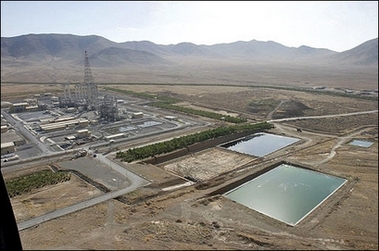TEHRAN - Iran said on Monday a U.S. threat to form an independent coalition
to impose sanctions if the U.N. Security Council failed to act over Tehran's
nuclear programme was an insult to the council's work.

A general view shows a
heavy water plant in Arak, 320 kms south of Tehran. President Mahmoud
Ahmadinejad insisted that Iran is no threat to Israel as he inaugurated a
heavy water production plant just five days before a UN Security Council
deadline to suspend sensitive nuclear fuel cycle work.
[AFP] |
The Los Angeles Times reported on Saturday that the U.S. ambassador to the
United Nations, John Bolton, had indicated Washington was prepared to act
independently with allies to freeze Iranian assets and restrict trade if the
council did not.
The United States has called for a swift response if Iran does not heed the
Security Council's Thursday deadline to halt uranium enrichment.
Analysts say divisions, particularly opposition from veto-wielding powers
Russia and China, could delay any moves.
"These remarks (by Bolton) are an obvious insult to the Security Council,"
Iranian government Gholamhossein Elham told a weekly news conference.
"These remarks are just bullying and baseless remarks and show that they are
not competent to be a member of the Security Council," he added.
Iran has so far shown no sign it will halt enrichment, a process which can
make fuel for nuclear power plants or material for nuclear bombs. The West
accuses Iran of seeking atomic weapons, a charge Tehran denies.
"The Islamic Republic has repeatedly announced that using nuclear weapons is
not in our defence policies," Elham said.
The LA Times said the United States planned to introduce a resolution
imposing penalties soon after the August 31 deadline if Iran's position did not
change.
Bolton said Washington was working on a parallel diplomatic track outside the
United Nations if Russia and China did not accept the resolution, the newspaper
reported.
"You don't need Security Council authority to impose sanctions, just as we
have," Bolton was quoted as saying.
The United States has had broad restrictions on almost all trade with Iran
since 1987.
In response to an offer of incentives made by the United States, China,
Russia, France, Britain and Germany, diplomats said Iran had hinted it might
consider halting enrichment after talks start but not as a precondition, as the
offer proposed.
Iran has shrugged off the threat of sanctions, saying such a move would push
already high oil prices higher still, hurting economies in industrialised
countries more than Iran.
International crude prices remain in sight of record highs partly because of
market fears that supply from Iran, the world's fourth largest oil exporter,
could be disrupted if the nuclear dispute escalates.